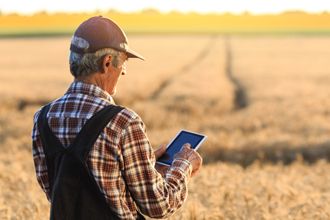Growing seeds of the future
“As a global company, our goal is to pack as much potential into every seed, like agronomics, genetic potential or pest tolerance, so that when a farmer opens a bag of seed, they know they can realize their yield potential,” says Bryce Eger, Corteva Agriscience vice president, seeds research and development.
Eger is responsible for Corteva seeds innovations and management strategy. He describes his role as, “investing to bring ideas to life that will provide opportunities for farmers.” That includes helping to make strategic decisions and investments in seed and crop development that encompasses everything from the advancement of trait packages, global crop breeding programs, biotechnology and decision science, like AI.
That’s no easy task, especially when it’s hard to predict what will be required more than 10 years in the future. Eger explains that, because bringing new seed products to market can take nearly a decade to develop, every decision requires flexibility and options to make sure seeds of the future meet farmers’ needs.
Corteva seed products are grown around the world, requiring Eger to keep close tabs on the needs of farmers in just about every growing region. It’s also necessary to keep abreast of global events, trends, and influences. He explains how geopolitics and varying regulatory environments in countries across the globe must be considered when investing in innovation and seed development. Changes in trade flows, supply channels, and consumer preferences are also factors in the company’s research and development decisions.
As a proud Canadian, Eger notes that Canadian agriculture is a trailblazer on the global stage as leaders who embrace change and new opportunities and champions of sustainable agriculture.
“My job is to maximize production for farmers, and I’m proud to contribute to the growth and sustainability of our industry here in Canada and across the globe,” says Eger, proudly explaining that, “every step of the research and development process contributes to a farmer’s productivity and our collective ability to create life for people though food production.”
Enhancing crop production
As the global biologicals branding and customer experience lead for Corteva Agriscience, Joanne Hewitson works to keep Canadian farmers competitive by providing access to the best tools and information available.
“I’ve always been passionate about helping farmers succeed and it’s a privilege to work in such an exciting, new space that allows me to serve farmers with what feel like the next big opportunity in agriculture – biologicals,” says Hewitson.
While the industry is still on a learning curve when it comes to realizing the potential biologicals can offer, Hewitson has a front row seat to the impacts biological products are having in countries around the world. “My job is to take a global perspective, look at what’s happening around the world and make it locally relevant for farmers,” she says. “We’re seeing first-hand how biological products can help maximize yield potential, like boosting the plant’s ability to efficiently utilize the soil, nutrients, water and sunlight available, or to help protect it from pests and disease.” Hewitson and her team can learn from and capture results and information from other growing regions that will help farmers here in Canada.
With the acquisition of Stoller and Symborg last year, Hewitson says Corteva Agriscience is building an incredible portfolio of biologicals that can help farmers boost the performance of their crops. These products offer plenty of opportunities for farmers, like enhanced uptake and nutrient efficiency, crop resilience and improving a crop’s ability manage abiotic stressors, and protection against pests and disease. “Biological products can help protect the potential of crop yield and performance, no matter where you farm in the world,” notes Hewitson, and it’s her job to make sure farmers understand how the products can fit into their crop production programs and work on their farms.
Working at a global level, Hewitson also keeps tabs on how trends impact crop production and farming practices, and how new opportunities in the biological market can help manage challenges and opportunities. From increasing consumer pressures to extreme weather events, it’s her job to understand how they impact farmers directly in those areas and the potential impact for Canadian farmers too. “I have the opportunity to learn from other parts of the world, while representing Canada in the global crop protection conversation,” she says proudly. “Canadian farmers have the benefit of global experiences with biologicals that will help enhance the sustainability and success of their crops and businesses.”






